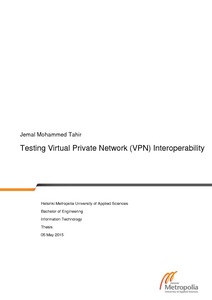Testing Virtual Private Network (VPN) Interoperability
Tahir, Jemal (2015)
Tahir, Jemal
Metropolia Ammattikorkeakoulu
2015
All rights reserved
Julkaisun pysyvä osoite on
https://urn.fi/URN:NBN:fi:amk-201505259995
https://urn.fi/URN:NBN:fi:amk-201505259995
Tiivistelmä
While corporations are growing their businesses, they may demand additional remote branch offices in a disparate location. These remote offices need to have a connection to their central corporate network so as to get access to resources and services securely over the public network. To achieve this demand, deploying Virtual Private Networks (VPNs) is an alternate technology.
The primary objective of this final year project was to test secure VPN interoperability between two different vendors’ gateways that are connected using a site-to-site VPN network, so that the data can be transported back and forth securely over a non-secure network infrastructure that is the Internet.
Practically, this final year project was carried out in a laboratory environment deploying two different vendor gateway devices to simulate a company’s sites which are in different geolocations. The network devices were configured to use an IPsec site-to-site VPN and the VPN tunnel formed was tested.
Moreover, this project verified the interoperability between dissimilar vendors via a secure VPN which is an IPsec site-to-site VPN. It can be concluded that interoperability was achieved and the data transported through the public network was tested and it was confirmed that the data was secure and encrypted.
As a corporate branch office grows in size, VPN authentication using Preshared Key (PSK) is not scalable and therefore it is a good choice to consider having a central certificate authority (CA) to authenticate VPN peers.
The primary objective of this final year project was to test secure VPN interoperability between two different vendors’ gateways that are connected using a site-to-site VPN network, so that the data can be transported back and forth securely over a non-secure network infrastructure that is the Internet.
Practically, this final year project was carried out in a laboratory environment deploying two different vendor gateway devices to simulate a company’s sites which are in different geolocations. The network devices were configured to use an IPsec site-to-site VPN and the VPN tunnel formed was tested.
Moreover, this project verified the interoperability between dissimilar vendors via a secure VPN which is an IPsec site-to-site VPN. It can be concluded that interoperability was achieved and the data transported through the public network was tested and it was confirmed that the data was secure and encrypted.
As a corporate branch office grows in size, VPN authentication using Preshared Key (PSK) is not scalable and therefore it is a good choice to consider having a central certificate authority (CA) to authenticate VPN peers.
